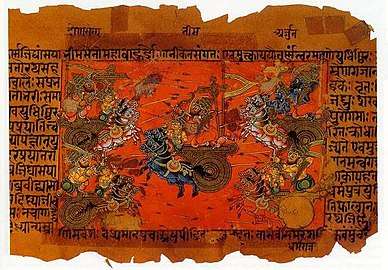Yudhishthira
In the Hindu epic Mahabharata, Yudhishthira (Sanskrit: युधिष्ठिर, IAST: Yudhiṣṭhira) is the eldest son of King Pandu and Queen Kunti and the king of Indraprastha and later of Hastinapura (Kuru). He was the leader of the successful Pandava side in the Kurukshetra War. At the end of the epic, he ascended to heaven. He was also blessed with the spiritual vision of second sight by a celestial Rishi as a boon.
| Yudhishthira | |
|---|---|
| Mahabharata character | |
Statue of Yudhishthira | |
| In-universe information | |
| Weapon | Spear |
| Family | Pandu (father) Dharmaraj (spiritual father) Kunti (mother) Bhima, Arjuna (brothers) Karna, Nakula, Sahadeva (half -brother); |
| Spouse | Draupadi Devika [1] |
| Children | Prativindhya,Suthanu (son and daughter from Draupadi) Yaudheya (son from Devika) |
| Relatives | Kauravas (paternal cousins); Krishna Balarama; (maternal cousins) |
Etymology
The word Yudhishthira means "the one who is steady in the war", from the words, yuddha (युद्ध) meaning 'war', and sthira (स्थिर) meaning 'steady'. His other names are-
- Bharata Vanshi (भारत वंशी) – descendant of Bharata[2]
- Ajatashatru (अजातशत्रु) – one who is born without enemies[3]
- Dharmanandan (धर्म नंदन) - The son of Dharma (Righteousness).
- Dharmaraj or Dharmaraya (धर्मराज) - Lord of Dharma.
- Pārtha – son of Pritha, also known as Kunti.
- Panduputra (पांडुपुत्र) - Son of Pandu.
Birth and Upbringing
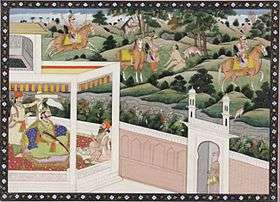
Once a Brahmin rishi, Kindama and his wife were enjoying nature in the forest when Yudhishthira's father Pandu accidentally shot at them, mistaking them for deer. Before dying, Kindama cursed the king to die when he engages in intercourse with any woman. Due to this curse, Pandu was unable to become father. As an additional penance for the murder, Pandu abdicated the throne of Hastinapura, and his blind brother Dhritarashtra took over the reins of the kingdom.[4]
After knowing the curse of Pandu, Kunti told him that he could be the father of child and told her boon of sage Durvasa. Then Pandu requested Kunti to apply her boon and suggested to call Dharma to get a truthful, knowledgeable and justice knowing son who can rule Hastinapur. On the full moon of May (Sanskrit: Jyeshth mah) first and eldest Pandavas Yudhishthira born.
Yudhishthira's four younger brothers were Bhima, (born by invoking Vayu); Arjuna, (born by invoking Indra); and the twins Nakula and Sahadeva (born by invoking Aśvins). If Karna, the son of Kunti born before her marriage by invoking Surya is counted, Yudhishthira would be the second-eldest of Kunti's children.
Yudhishthira was trained in religion, science, administration and military arts by the Kuru preceptors, Kripa and Drona. Specifically, he became a master in using the spear and war chariot. It is said that his spear was so strong that it could penetrate a stone wall as though it were a piece of paper. His chariot always flew at a 4 finger distance above the ground due to his piety.[5]
Marriage and children
Yudhishthira had two wives, Draupadi and Devika[6]. Draupadi was the common wife of all the Pandavas, and she bore children for each of the 5. Draupadi bore Yudhishthira a son, Prativindhya and a daughter, Suthanu.[7] Yudhishthira married Devika in a self choice marriage ceremony, arranged by her father Govasena, who was the king of Sivi Kingdom. They had a son, Yaudheya. Yaudheya was also the name of the son of Prativindhya.[8] Suthanu was married to the son of Lord Krishna and Satyabhama, Bhanu.
Indraprastha
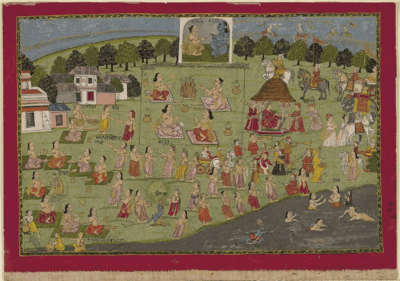
After the coronation at Indraprastha, Yudhishthira set out to perform the Rajasuya yagna.
Arjuna, Bhima, Nakula, and Sahadeva led armies across the four corners of the world to obtain tributes from all kingdoms for Yudhishthira's sacrifice. The non-compliant Magadha king, Jarasandha was defeated by Bhima and Krishna. At his sacrifice, Yudhishthira chose Krishna as his honoured guest.
Losing Kingdom and Exile
Yudhishthira succumbed to Shakuni's challenge in the Pachisi (game of dice). He lost his kingdom, his brothers and Draupadi. While playing for second time, he lost all his kingdom in the game and was forced into exile for 13 years, which included one year in anonymity. Yudhishthira was challenged to play that game because his wife Draupadi insulted his cousin brothers the Kauravas, Shakuni used the dice made from the bones of his father, which always ensured that he got the number he wanted and Yudhisthira was allowed to bet whatever he had he was proud of and had right over. After losing his brothers and his empire he bet himself and also his wife which lead to the Vastrapaharan.
Yaksha Prashna
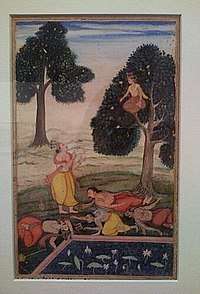
During their exile, the 4 other Pandavas happened upon a lake, which was haunted by a Yaksha. The Yaksha challenged the brothers to answer his moral questions before drinking the water; the four Pandavas laughed and drank the water anyway. As a result, they choked on the water and died. Yudhishthira went in last, answered many questions put forth to him by the Yaksha and revived his brothers. This story is often cited as an example of Yudhishthira's upright principles.[9] The Yaksha later identified himself as Yudhishthira's father, Dharma and pointed them to the kingdom of Matsya to spend their last year in exile anonymously.
Along with his brothers, Yudhishthira spent his last year of exile in the kingdom of Matsya. He disguised himself as a Brahmin named Kank (among themselves Pandavas called him Jaya) and taught the game of dice to the king.[10]
Kurukshetra War
When the period of exile was completed, Duryodhana refused to return Yudhishthira's kingdom. Yudhishthira made numerous diplomatic efforts to retrieve his kingdom peacefully but in vain. He was convinced by Krishna to wage war.
The flag of Yudhishthira's chariot bore the image of a golden Moon with planets around it. Two large and beautiful kettle-drums, called Nanda and Upananda, were tied to it.[11] Before the war started, Yudhisthira stepped down from his chariot to take blessings firm his grand sire Bhishma, teachers Drona and Kripa and uncle Shalya, who all were in his opposite side in the war showing his respect towards his elders.
King of Hastinapur
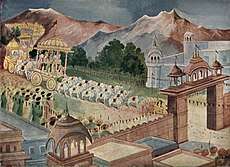
After getting victory in the war, Yudhisthira was crowned as the Emperor of Hastinapura for 36 years. He performed Ashwamedha on Krishna and Vyasa's insistence. In this sacrifice, a horse was released to wander for a year, and Yudhisthira's brother Arjuna led the Pandava army, following the horse. The kings of all the countries where the horse wandered were asked to submit to Yudhisthira's rule or face war. All paid tribute, once again establishing Yudhisthira as the undisputed Emperor of Bharat Varsh.[12]
Retirement and Ascent To Heaven
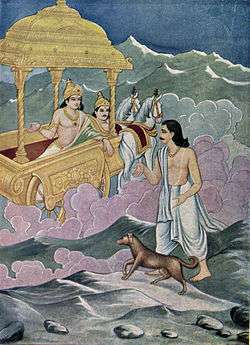
Upon the onset of the Kali yuga and the departure of Krishna, Yudhishthira and his brothers retired, leaving the throne to their only descendant to survive the war of Kurukshetra, Arjuna's grandson, Parikshit. Giving up all their belongings and ties, the Pandavas, accompanied by a dog, made their final journey of pilgrimage to the Himalayas. Among the Pandavas and Draupadi, one-by-one died on the way to reach the top, starting from Draupadi. Finally, it was Yudhisthira who was able to reach the top, with the dog accompanying him.
Dog Test
On reaching the top, Indra asked him to abandon the dog before entering the Heaven. But Yudhishthira refused to do so, citing the dog's unflinching loyalty as a reason. Indra said he let his family die, but Yudhishthira said he could not prevent their deaths, but to abandon a poor creature was a great sin. It turned out that the dog was his god-father Dharma Deva in disguise.[13]
Skills
He was master in spear-fighting and chariot racing. Yudhishthira was a polyglot, knowing unusual languages. He was known for his honesty, justice, sagacity, tolerance, good behavior and discernment.[15]
Dhritarashtra said to Sanjaya "The son of Kunti and Pandu, Yudhishthira, is virtuous and brave and eschews deeds that bring on shame. Endued with great energy, he hath been wronged by Duryodhana. If he were not high-minded, they would in wrath burn the Dhritarashtras. I do not so much dread Arjuna or Bhima or Krishna or the twin brothers as I dread the wrath of the king, O Suta, when his wrath is excited. His austerities are great; he is devoted to Brahmacharya practices. His heart's wishes will certainly be fulfilled. When I think of his wrath, O Sanjaya, and consider how just it is, I am filled with alarm."[16]
Yudhishthira acquired deep spiritual knowledge from Lord Shiva and many prominent sages including Vyasa, Parashurama, Bhrigu, Savarni Manu, Narada, Markandeya, Asita Devala and Dhaumya. (Mahabharata Sabha Parva Section 77).
In the media
Being an important person in epic Mahabharata, Yudhisthira's role has been enacted by various actors over the years.
- In the Hindi film Draupadi (1931) Elizer played the character.
- In the Tamil film Karnan (1964) Prem Kumar Played the character.
- In the Telugu film Veerabhimanyu (1965) Dhulipala played the character.
- In the Telugu film Daana Veera Soora Karna (1977) M. Prabhakar Reddy played the character.
- In the Hindi television series Mahabharat (1988) and Mahabharat Katha (1997), Gajendra Chauhan portrayed the character.
- In the Hindi television series Shri Krishna (1993) Raman Khatri portrayed the character.
- In the Hindi television series Ek Aur Mahabharat (1997) Virendra Singh played the character.
- In the Hindi television series Draupadi (2001) Arup Pal played the character.
- In the Hindi television series Mahabharat (2013), Rohit Bhardwaj portrayed the character.
- Manoj Bajpayee has also voiced the character in the Hindi animation film Mahabharat (2013).
- In the Hindi television series Dharmakshetra (2014), Chandan K Anand played the character.
- In the Hindi television series Suryaputra Karn (2015), Kanan Malhotra played the role.
- In the Kannada film Kurukshetra (2019), Shashi Kumar portrayed the character.
- There is a red dragon in the Iron Realms Entertainment game Aetolia, The Midnight Age named Yudhishthira.
Citations
- https://web.archive.org/web/20100116130453/http://www.sacred-texts.com/hin/m01/m01096.htm
- Ashram, Vidur Sewa (1979). Age of Bhārata War. Motilal Banarsidass Publishers. p. 167.
- Godbole, Justin E. Abbott a. Pandit Narhar R. (1988). Stories of indian saints (4th ed.). Delhi: Motilal Banarsidass. p. 402. ISBN 9788120804692.
- Lochtefeld, James G. (2002). The illustrated encyclopedia of Hinduism (1st. ed.). New York: Rosen. pp. 194–196. ISBN 9780823931798.
- Mittal, J.P. (2006). History of ancient India : a new version. New Delhi: Atlantic. p. 477. ISBN 9788126906161.
- "Pandava : Apart from Draupadi, Yudhishthira had one more wife Devika". newstrend.news. Retrieved 28 April 2020.
- https://www.wisdomlib.org/definition/sutanu
- https://www.wisdomlib.org/definition/yaudheya
- Sehgal, Sunil (1999). Encyclopaedia of Hinduism (1st ed.). New Delhi: Sarup & Sons. ISBN 9788176250641.
- Kishore, B. R. (2001). Hinduism. New Delhi: Diamond Publ. ISBN 9788171820733.
- Kapoor, Subodh, ed. (2002). The Indian encyclopaedia : biographical, historical, religious, administrative, ethnological, commercial and scientific (1st ed.). New Delhi: Cosmo Publications. p. 4462. ISBN 9788177552713.
- "The Mahabharata, Book 14: Aswamedha Parva Index". www.sacred-texts.com. Retrieved 9 June 2020.
- Agarwal, Satya P. (2002). Selections from the Mahabharata : re-affirming Gita's call for the god of all (1. Aufl. ed.). Delhi: Motilal Banarsidass. ISBN 9788120818743.
- transl. (2004). Buitenen, J.A.B. van (ed.). Book 11. The book of the women. Chicago [u.a.]: Univ. of Chicago Press. ISBN 9780226252506.
- "Mahabharata Text".
- "Mahabharata Section XXII".

